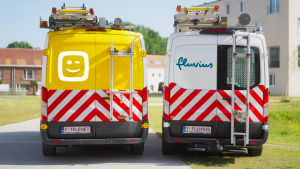
After more than 40 years of operation, DTVE is closing its doors and our website will no longer be updated daily. Thank you for all of your support.
Fries: no plan to replicate Telenet/Fluvius model in the Netherlands
 Liberty Global-backed Belgian service provider Telenet’s plan to split off its infrastructure into a new joint venture with utility group Fluvius does not offer a template for a similar move in neighbouring the Netherlands, according to Liberty Global CEO Mike Fries.
Liberty Global-backed Belgian service provider Telenet’s plan to split off its infrastructure into a new joint venture with utility group Fluvius does not offer a template for a similar move in neighbouring the Netherlands, according to Liberty Global CEO Mike Fries.
Speaking to analysts after Liberty Global posted less-than-stellar Q2 results at the end of last week, Fries said that from Liberty’s perspectivethe deal made sense because it offered a long-term upgrade plan that gives Telenet’s management the ability to use a range of technologies or buy fibre from third parties.
The creation of the NetCo by Telenet and Fluvius will create a company that already enjoys 60% utilisation and “really reasonable build costs for at least the first half of the network”, said Fries.
He said that the deal also gave Telenet “the option to work with strategic partners in the market to ensure the optimal use of capital for all of us”.
Without those investors, Fries admitted that Telenet would continue to consolidate capex in its own results, meaning a reduction in free cash-flow. Investing in FTTH is an expensive business, a factor that has driven service providers to look for infrastrlucture joint venture partners across Europe.
However, Fries said that the situation in the Netherlands, where it operates the VodafoneZiggo JV with Vodafone, is different.
He said that the Dutch management team was focusing on upgrading its HFC infrastructure with DOCSIS 4.0 rather than looking to migrate to FTTH, meaning that “costs look very reasonable” at €150 to €200 per home.
He said that VodafoneZiggo was already offering 1Gbps services to 86% of homes, with plans to up that to 100% by the end of the year.
Telenet struck a binding agreement with utility provider and network operator Fluvius last month that will ultimately see Telenet evolve its HFC cable network infrastructure in a combined footprint to fibre-to-the-home technology.
Fluvius operates electricity and gas utilities across Flanders and also provides TV and broadband services in around 100 municipalities. The company is owned by a group of Flemish intermunicipal partnerships.
The pair said their ambition is to provide speeds of 10Gbps across the entire footprint in time, with a clear roadmap to achieve this.


